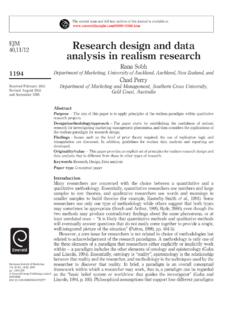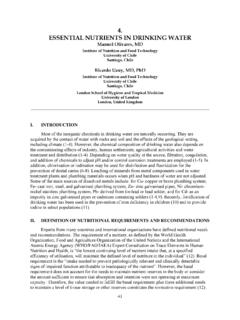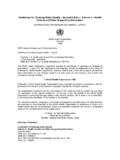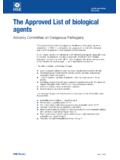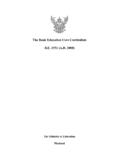Transcription of The issue of quality in qualitative research - …
1 International Journal of research & Method in Education Vol. 30, No. 3, November 2007, pp. 287 305. The issue of quality in qualitative research Martyn Hammersley*. The Open University, UK. International 1743-727X. Original Taylor 302007. 30. MartynHammersley 000002007. and &Article Francis Francis (print)/1743-7288. Journal of research (online). & Method in Education This article addresses the perennial issue of the criteria by which qualitative research should be eval- uated. At the present time, there is a sharp conflict between demands for explicit criteria , for exam- ple in order to serve systematic reviewing and evidence-based practice, and arguments on the part of some qualitative researchers that such criteria are neither necessary nor desirable.
2 At issue here, in part, is what the term criterion' means, and what role criteria could play in the context of qual- itative enquiry. Equally important, though, is the question of whether a single set of criteria is possi- ble across qualitative research , given the fundamental areas of disagreement within it. These reflect divergent paradigms framed by value assumptions about what is and is not worth investigation. In addition, there are differences in methodological orientation: over what counts as rigorous enquiry, realism versus constructionism, and whether the goal of research is to produce knowledge or to serve other goals.
3 The value of qualitative research has recently come to be questioned again, after many years during which it was widely accepted. In large part, this has been stimulated by external criticism of educational research , on the grounds that it does not serve evidence-based practice There are those who argue that much qualitative research is of poor standard, but more usually the complaint is that there is no clearly defined set of quality criteria available for judging it, so that it is of uncertain quality . There are two assumptions underpinning these criticisms that need to be addressed.
4 First, what is involved here is an at least implicitly comparative assessment: it is assumed that clearly defined criteria of quality are already available for quantitative The other assumption is that explicit assessment criteria are needed, and two main reasons seem usually to be involved. First, it is believed that unless research - ers operate on the basis of such criteria , their work will be of poor quality . Secondly, it is argued that users of research require some reliable means of judging its quality , and that a set of criteria would meet this need.
5 *Faculty of Education and Language Studies, Level 3 Stuart Hall Building, The Open University, Walton Hall, Milton Keynes MK7 6AA, UK. Email: ISSN 1743-727X (print)/ISSN 1743-7288 (online)/07/030287 19. 2007 Taylor & Francis DOI: 288 M. Hammersley In this article, I will focus on the second set of assumptions, examining some of the arguments about whether criteria are necessary, before going on to consider whether a single set is possible given the present state of qualitative enquiry. Are criteria necessary? Whether there are criteria by which qualitative research can be judged, and if so what character these should have, are issues about which there has been much debate but little agreement.
6 There have been many attempts to identify Some writers have tried to apply what they see as traditional quantitative criteria , such as validity and reliability, to qualitative work. Others have reformulated these epistemic criteria and, very often, added non-epistemic ones, whether in terms of giving voice' to the marginalised or bringing about practical or political effects of some kind improving education, challenging injustice or oppression, and so on. At the same time, there are some writers who appear to reject the very possibility of criteria , at least as conven- tionally understood.
7 For example, many years ago, John Smith argued that there can be no criteria to reconcile discourse (to sort out the trustworthy from the untrust- worthy results)' (Smith, 1984, p. 384; see also Smith, 1989b and Schwandt, 1996). Smith claimed that attempts to apply criteria to qualitative research would inevitably result in confusion and inconsistency, because criteria are incompatible with the basic philosophical assumptions of this type of enquiry. More recently, he has insisted that criteria should not be thought of in abstraction, but as a list of features that we think, or more or less agree at any given time, and place, characterize good versus bad inquiry'.
8 And, in addition: This is a list that can be challenged, added to, subtracted from, modified, and so on, as it is applied in actual practice in its actual application to actual inquiries' (Smith & Deemer, 2000, p. 894). I suspect that, despite appear- ances, Smith's views have not changed much over the period concerned; the differ- ence between the two formulations hinges on what is meant by the term criterion'. And this is the nub of the matter. We can provide two contrasting definitions which illustrate the scope for disagree- ment about this.
9 At one end of the spectrum, criterion' means an observable indicator that can tell us (along with other criteria ) whether or not the findings of a study are valid, or are of value in more general terms. In other words, a set of criteria here amounts to a checklist that is sufficiently explicit and concrete in its reference for it to be filled in with little error; and also comprehensive enough to cover everything that needs to be taken into account in judging quality . Very often such criteria are seen as relating to the procedures employed in carrying out the research , on the implicit assumption that these determine the validity of findings.
10 Towards the other end of the spectrum are the kinds of criteria outlined by Smith and Deemer: a list of considerations, never fully explicit, that it is agreed in local circumstances should be taken into account in judging qualitative work, a list that can serve as no more than a reminder and that is always open to revision in the process of being used indeed, which only gains meaning in particular It seems to me that the second definition comes closer to what is possible and desirable than the first, though it is not entirely satisfactory. issue of quality in qualitative research 289.
